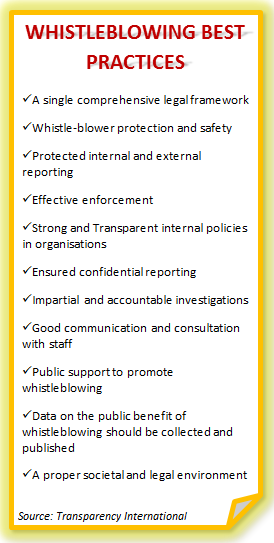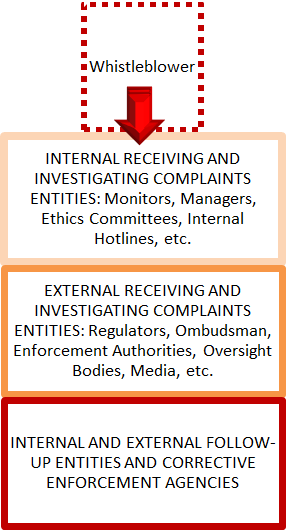Whistleblowing is the disclosure of information about perceived wrongdoing, corrupt, illegal, fraudulent, or hazardous activities committed, in or by, public, or private, sector organisations and the risk thereof, to individuals, or entities, believed to be able to effect action. The ultimate goal of whistleblowing is to protect the public interest.[1]
What is Whistleblowing?
Transparency International (TI) offers a broad definition of whistleblowing as the disclosure, or reporting of wrongdoing, including, but not limited to corruption; criminal offences; breaches of legal obligation; miscarriages of justice; specific dangers to public health, safety or the environment; abuse of authority; unauthorised use of public funds or property; gross waste or mismanagement; conflict of interest; and acts to cover up any of the above.[2]
Why is it important?
Whistle-blowers play an essential role in exposing corruption, fraud, mismanagement and other wrongdoing that threatens public health and safety, financial integrity, human rights, the environment, and the rule of law.[3]
Major bribery and corruption scandals demonstrate the damage done by the failure to report wrongdoing as soon as it is discovered. Whistleblowing is an important tool in the prevention and detection of corruption and other malpractice.[4]
How does it work?
According to TI, in order to function properly, whistleblowing must be supported by:
- An effective system of legal protection of whistle-blowers against retaliation with full compensation in case of reprisals;
- Adequate mechanisms to ensure that disclosures are properly handled and thoroughly investigated;
- Public awareness-raising about the benefits of whistleblowing.
Effective whistleblowing legislation and the tools to implement it are necessary in order to build integrity and prevent corruption in the security sector. The following international conventions recognise whistleblowing as an effective tool for fighting corruption:
- The UN Convention against Corruption (Art. 33)
- The Council of Europe Civil Law Convention on Corruption (Art. 9)
- The Council of Europe Criminal Law Convention (Art. 22)
Existing national whistleblowing legislation is often incomplete. There is a need for considerable efforts to develop it further. This legal framework should be clear, comprehensive and easy to use. Legislation must incorporate provisions that protect the whistleblower, cover the public, private, and non-profit sectors and provide reliable reporting channels to communicate concerns. It should cover a broad range of issues, from actual criminal offences to the potential harm of wrongdoings and other consequences.[5]
Both public and private employees and those outside the traditional employee-employer relationship (consultants, temporary workers, trainees, etc.) should be protected from reprisal for honestly reporting concerns. Protection should be extended to those corroborating reports and individuals closely associated with the whistleblower, such as family members. The legislation should include the right to refuse participating in wrongdoings. Whistleblowers should have the option to report externally to regulators, enforcement authorities and other competent oversight bodies. As a last resort, disclosures to the media should also be protected.[6]
A comprehensive legal framework should be accompanied by an effective enforcement system. For that, an independent public body with enough autonomy should be set up, or designated, to oversee the functioning of the law and to receive and investigate complaints. Participation of key stakeholders, such as trade unions, business associations and civil society actors, should also be included in the process.[7]
There must be clear and easy-to-use channels of communication available for the whistleblowers to disclose information confidentially and anonymously. These channels include: line managers, ethics committees, ombudsperson, internal hotlines, and web-based reporting tools. They must be accompanied by an effective follow-up system to ensure complaints are properly handled. It is crucial that whistleblower policies are supported by the top management. They should be promoted throughout the organisation and awareness should be raised about the importance of whistleblowing as an effective tool for fighting corruption.[8]
Who is involved?
A whistleblowing system includes: the individuals that come forward to report a wrongdoing; entities that register and process the disclosure; entities that impose sanctions and take corrective measures; entities who protect the whistleblower; and actors who promote and support the benefits of whistleblowing.
Resources
Centre for Integrity in the Defence Sector (2015) Guides to Good Governance. Professionalism and integrity in the public service.
Council of Europe, Civil Law Convention on Corruption.
Council of Europe, 1999, Criminal Law Convention on Corruption.
DCAF-UNDP (2007), Monitoring and Investigating the Security Sector.
DCAF (2015) Parliamentary Brief: Building Integrity in Defence.
NATO-DCAF, (2010). Building Integrity and Reducing Corruption in Defence. A Compendium of Best Practices.
Transparency International (2009), Alternative to Silence. Whistleblower protection in 10 European Countries.
Transparency International (2010), Policy Position 01: Whistleblowing: an effective tool in the fight against corruption.
Transparency International (2013), International principles for Whistleblower Legislation: Best Practices for Laws to Protect Whistleblowers and support Whistleblowing in the Public Interest.
Transparency International (2013), Whistleblowing in Europe. Legal Protections for whistleblowers in the EU.
UN Office on Drugs and Crime, United Nations Convention Against Corruption.
[1] Transparency International (TI) 2013, International Principles for whistleblower legislation: Best practices for laws to protect whistleblowers and support whistleblowing in the public interest.
[2] Ibid.
[3] Ibid. & TI (2010), Whistleblowing: an effective tool in the fight against corruption. Policy Position 01.
[4] TI (2010), Whistleblowing: an effective tool in the fight against corruption. Policy Position 01.
[5] Ibid.
[6] Ibid.
[7] Ibid.
[8] Ibid.





